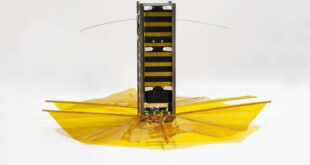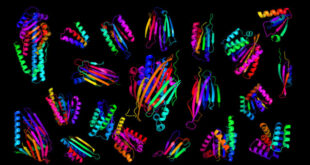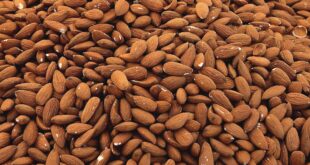A research team led by Flinders University’s Professor Nikolai Petrovsky has completed a human clinical trial on an adjuvant vaccine designed to eliminate the risk of an allergic reaction to European honeybee stings.
A European honeybee (Apis mellifera). Image credit: Charles J. Sharp / CC BY-SA 3.0.
Allergic reactions to bee stings remain a major global clinical problem. Although venom immunotherapy can be effective at preventing life-threatening reactions to future stings, it can itself cause severe and even — although rare — life-threatening reactions.
“While a commercial bee venom therapy is already available, it requires patients to have over 50 injections over a three-year period to build up their immune system,” said Dr. Anthony Smith, a researcher at Flinders Medical Centre.
The clinical trial included 27 healthy adults with a history of rapid-onset systemic allergic reactions to bee stings.
The vaccine used in the trial contained the Advax adjuvant, a new adjuvant derived from the natural plant-based polysaccharide delta inulin.
This ingredient, developed by Vaxine Pty Ltd in Adelaide, Australia, helps the body neutralize the bee venom at a faster rate.
The Advax adjuvant favorably enhanced the immunogenicity of the honeybee venom immunotherapy, with an early and prolonged switch to specific IgG4 production. Image credit: Heddle et al, doi: 10.1016/j.jaci.2019.03.035.
“The aim was to see if the Advax adjuvant would safely speed up and improve bee sting immunotherapy,” said Dr. Robert Heddle, a researcher at the University of Adelaide, Royal Adelaide Hospital and Flinders University.
“Our technology is like adding a turbocharger to a car and in this case makes the bee allergy vaccine much more powerful, allowing the immune system to better neutralize the bee venom and prevent allergic symptoms,” Professor Petrovsky added.
“Our results are very promising and confirmed the safety of this approach to improving bee sting immunotherapy,” Dr. Heddle said.
“The current treatment option for serious bee venom allergies is lengthy and cumbersome, so I hope this enhanced bee venom therapy brings about faster, but longer lasting protection to bee stings for allergic individuals,” Dr. Smith said.
The findings were published in the Journal of Allergy and Clinical Immunology.
_____
Robert Heddle et al. Randomized controlled trial demonstrating the benefits of delta inulin adjuvanted immunotherapy in patients with bee venom allergy. Journal of Allergy and Clinical Immunology, published online July 9, 2019; doi: 10.1016/j.jaci.2019.03.035
 #Bizwhiznetwork.com Innovation ΛI |Technology News
#Bizwhiznetwork.com Innovation ΛI |Technology News





